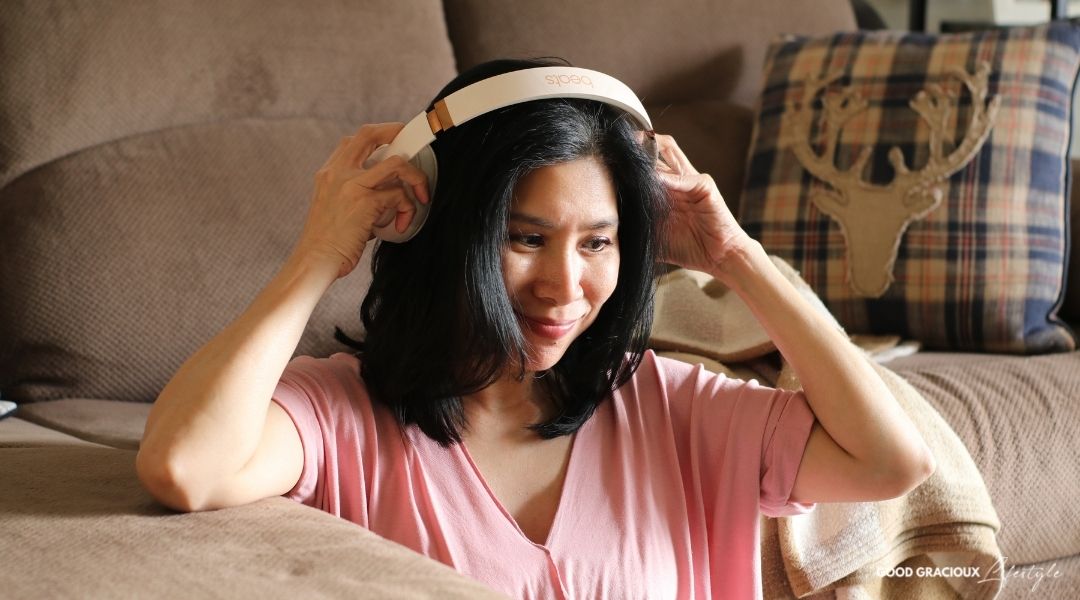My favorite medical resource – Dr. Trinh, presented his series on Brain Health, and this time, he explored the benefits of listening to good music. There are also things, he said we can do to improve our brain health. I’ve listed them all in this post. Read on.

If you’ve been following my blog, you’ll notice that one of my favorite resources for all things brain health-related is Dr. Trinh. He’s that doctor who goes all around Orange County, presenting his topics wearing jeans and sandals in front of a multi-generational audience.
Yep, he doesn’t do a white lab coat and well-pressed suits (sometimes he does, but most of the time, nah).
He sprinkles his presentation with humor which keeps his audience including me at ease and receptive.
His casual attire makes his talks less of an academic lecture and more of an engaging family conversation.
But his mission is serious and focused.
He wants to amplify the importance of our mental acuity, how to maintain our brainpower, and what to do when we feel like we’re losing “it.”


Dr. Trinh during his Music and Brain Health presentation in Orange County. Standing in front of his intimate audience, he held 4 pieces of red licorice.
“Eat in moderation,” he chuckled, acknowledging the sugar content of his chosen snack for the day.
So what good does listening to music do for us?
Here are the things that Dr. Trinh shared during his presentation:
1. Music energizes, calms, or stirs up our emotions.
We’ve seen athletes with their large noise-canceling headphones on to pump them up before their big game.
We also see that guy or gal in the gym seemingly absorbed in their bench press reps and wearing their wireless headsets (uhm, I may be one of them at times, maybe you too).
Here’s one more, have you ever sung your heart out alongside Celine Dion’s My Heart Will Go On blasting the speakers while you drive your car?
Or maybe, to calm your nerves, you listen to your Zen music?
Music arouses your different emotions, doesn’t it?
You feel dramatic, active, adventurous, inspired, sentimental, or nostalgic, depending on what type of music you are tuned in.
2. Music instigates mental wellness. It promotes your self-care.
Music is my kind of therapeutic pursuit. I do the laundry, wash the dishes, walk around the house, or sit still with my headphones on.
My playlist includes uplifting music (for motivation), mainstream pop (to perk me up), and loads of audiobooks too.
I swear by the positive effects of it.
It’s the kind of wellness that’s better than a prescription drug and carries no side effects (unless you blast your ears and suffer hearing loss.. but please don’t do that).



3. Music is good for brain activity.
After using fMRI and PET scans of brain activity while listening to music, neuroscientists discovered multiple areas of the brain are stimulated.
4. Music is good for problem-solving.
Researchers believe that music could help us solve our problems more creatively in both academic and social settings.

5. Music is good for high executive functioning.
Those who play an instrument and sing develop high-executive functioning including planning, strategizing, analysis, and attention.
6. Music is good for memory.
Music and our memories are deeply connected to our meaningful life experiences. Music is also one of the last memory centers of the brain that deteriorate for those with Alzheimer’s or Dementia.
7. Music is good for mood and feelings.
The hormone serotonin is released which helps decrease symptoms of depression; it also helps with sleep and learning skills. The pleasure reward-motivator hormone dopamine is also released when we listen to music.
8. Music is good for human connection.
When we experience music with others, the “bonding” hormone oxytocin is released. It involves increased connection, trust, and empathy between people.
Dr. Trinh’s 6 Tips to Improve Your Brain Health
1. Get physical exercise –
to improve circulation; according to him, there’s a correlation between poor health and poor circulation.
2. Do brain exercises –
anything that makes you think (sudoku, chess, a new language, music..)
3. Socialize –
hang out with family or friends more often.
4. Get enough sleep –
7-8 hours. Removal of plaques in our brains happens when we’re sleeping.
5. Get other medical conditions under control –
to reduce risk factors; high blood pressure clogs our blood circulation; bacteria found in our gums are also found in the brain affected by Alzheimer’s.
6. Eat the right food –
nutrition for the body is also nutrition for the brain.

If music were a language, it would be the language of feeling.
Through music, you can express your love or sadness.
When you feel so wound up with the stress of work, family life, or your caregiving life, soothing music is like the caress of a warm hand telling your mind, “don’t worry, everything will be ok”.
– Rowena
Hush now, let’s put our music on.
On to the next post,







